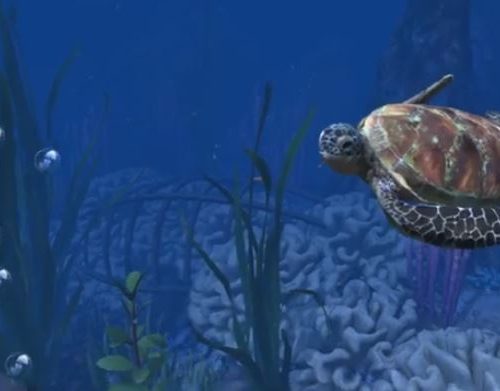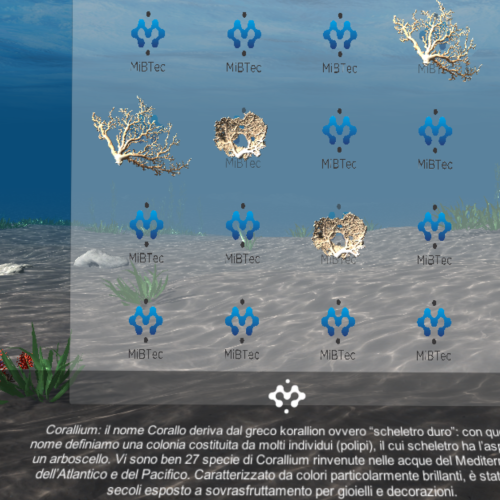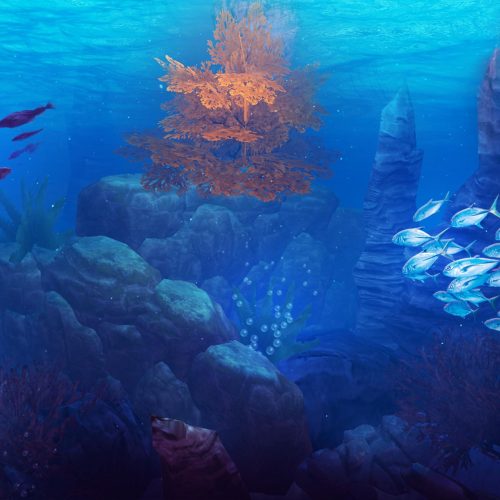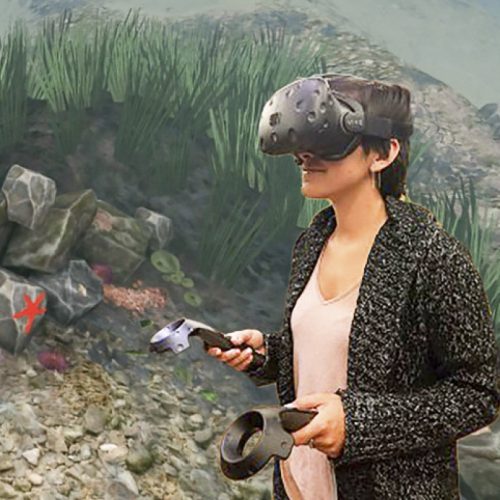
The MiBTec, as a centre of excellence and research of the University of Milano Bicocca, contributes to the development of projects that adopt the Sustainable Development Goals of 2030 of the United Nations. An ambitious and universal call-to-action, based on 17 objectives that involve stakeholders from all over the world during the Decade of Action.
With a privileged Human-Centered outline, the centre joined the #ForPeopleForPlanet approach, focusing particularly on the following points: (4) Quality Education; (9) Industry, Innovation and Infrastructure; (13) Climate Action; (14) Life below Water; (15) Life on Land.
The objectives relative to this research line encompass the idea of bringing participants into immersive and multisensorial simulations, able to transmit relevant concepts in respect of sustainability with a privileged focus on promoting an attitudinal and behavioural change toward a more sustainable lifestyle and a greater knowledge acquisition in respect of environmental issues. The main aim of our projects focuses on understanding and improving human-nature connectedness, in a controlled laboratory setting, through innovative devices able to bring together Virtual Reality (VR) and multisensorial perception.
Goals
Developing and testing VR, AR or MR environments along with multisensorial systems to promote further understanding in everyday people in respect of complex or invisible climate issues’ concepts.
In the following lines we introduce some of our projects and devices involved in our research line:
- In partnership with Politecnico di Milano, we are currently assessing the educational and experiential value of an Augmented Reality (AR) application which covers themes related to ocean conservation and reduction of the use, and relative dispersion, of microplastics inside the marine environment.
- Our centre also teamed up with the IllusiOcean™ exhibition, for which a series of applications have been developed in order to sensibilize the public to coral reefs, their restoration, and concentration of natural gases on the sea bed.
- Furthermore, we are currently finalizing a line of research focused on the usage of innovative neuropsychological devices to measure and favour nature connectedness.
Who we are looking for?
Students with a keen interest in the topic that are looking forward to spend their internship and/or thesis period at MiBTec’s centre.
Particularly, engineers and computer science students, capable of developing Virtual Reality experiences, with the following qualifications:
- Knowledge in the development of VR/AR environments through Unity software
- Knowledge of C#
- Experiences or keen interest in the integration of multisensorial devices in VR environments (e.g. Teslasuit, STRATOS Explore by Ultraleap, Cyberith Virtualizer, Touch X by 3D Systems, Digitally-controlled scent delivery system by O’Widgets)
Furthermore, we are looking forward to psychology students interested in sustainability, novel technologies and applied research. The internship and/or thesis experience will involve:
- Assistance in the development of the research design related to the VR environments
- Assistance in recruiting subjects
- Data analysis and their effective presentation
If you are interested contact:
Monica Clerici – m.clerici13@campus.unimib.it
Theoretical background
Environmental issues are one of our world’s most urgent concerns and include an ensemble of natural, social and economic problems (Scurati et al., 2021). As supported by United Nations’ development goals for 2030, we need to make fast-paced and radical changes in our society in order to consistently limit climate change consequences.
A first step in to making this change happen, can be carried out by promoting environmental literacy for everyday people: which can be defined as the knowledge of our natural resources and virtuous ecological practices to protect them. Virtual Reality (VR) could be used as a tool to teach complex climate science and to indirectly expose people to natural environments that would be otherwise impossible to see and feel (Markowitz & Bailenson, 2021).
Immersive VR has been often used in research as a proof-of-concept tool, recreating scenarios that users can perceive with multiple senses, providing the sensation of actually “being there” (Fauville et al., 2020). As reported by Markowitz and colleagues (2021), researchers have only scratched the surface of IVR’s potential to deliver environmentally considered experiences while measuring their psychological impact (e.g. Markowitz et al., 2018; Fauville et al., 2021; Ahn et al., 2016). Furthermore, very few studies focused on implementing multisensory stimulation (e.g. Ke et al., 2019) and/or embodiment (e.g. Markowitz et al., 2018): mixed results in this sense have been found and further research is required. The presence of auditory, haptic, olfactory and other sensory feedback, allows users to be present in a world that feels unmediated and that can aid learning and other cognitive processes (Markowitz et al., 2018).
In addition, the ability of the experience to trigger empathetic responses could increase engagement in respect of environmental issues (Fauville et al., 2020). Assessing psychologically and technically driven variables, related to these experiences, could lead us to partially bridge the lack of empirical data, allowing the shift from a proof-of-concept to a validated educational tool.





